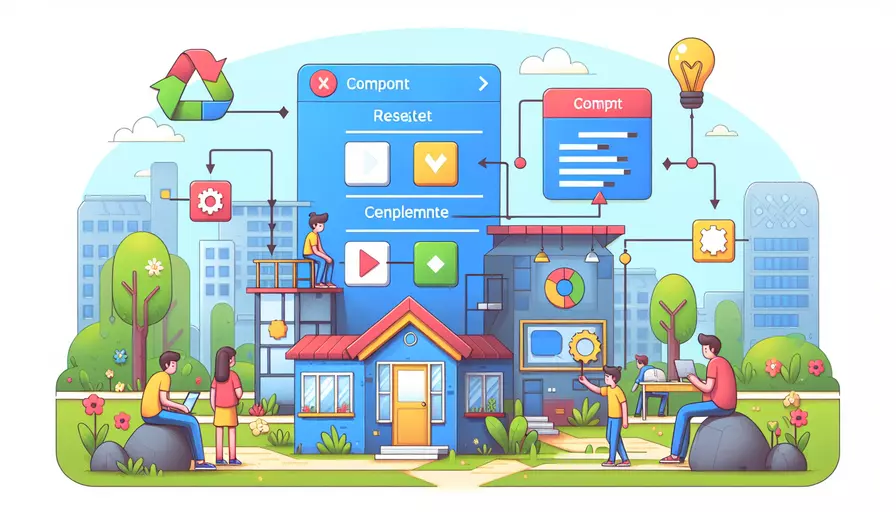
在Vue中重制子组件可以通过以下几种方法:1、使用键值重置组件、2、利用生命周期钩子、3、使用Vuex进行状态管理。 这些方法各有优缺点,选择合适的方法可以有效重置子组件的状态或内容,从而实现所需的功能。
一、使用键值重置组件
使用 key 属性是一种简单且有效的方法,通过改变 key 属性的值,Vue 会认为这是一个全新的组件,从而重新渲染该组件。这种方法特别适用于需要完全重置组件状态的情况。
<template>
<div>
<button @click="resetComponent">重置子组件</button>
<ChildComponent :key="componentKey"/>
</div>
</template>
<script>
import ChildComponent from './ChildComponent.vue';
export default {
components: { ChildComponent },
data() {
return {
componentKey: 0
};
},
methods: {
resetComponent() {
this.componentKey += 1;
}
}
};
</script>
优点:
- 简单直观,不需要更改子组件内部代码。
- 适合重置整个组件状态。
缺点:
- 会销毁并重新创建组件,可能影响性能。
二、利用生命周期钩子
可以在子组件内部使用生命周期钩子方法来重置其状态。比如,在接收到父组件的某个信号后,子组件可以在 created 或 mounted 钩子中执行重置逻辑。
<template>
<div>
<!-- 子组件内容 -->
</div>
</template>
<script>
export default {
props: ['resetSignal'],
watch: {
resetSignal(newVal) {
if (newVal) {
this.resetComponentState();
}
}
},
methods: {
resetComponentState() {
// 重置子组件状态的逻辑
}
}
};
</script>
优点:
- 不会销毁和重建组件,保留了组件的生命周期。
- 适合部分状态的重置。
缺点:
- 需要修改子组件代码。
三、使用Vuex进行状态管理
通过Vuex进行状态管理,可以将组件的状态存储在全局的状态管理中,重置操作则通过对Vuex状态的修改来实现。
// store.js
export default new Vuex.Store({
state: {
componentState: {}
},
mutations: {
resetComponentState(state) {
state.componentState = {};
}
}
});
// ParentComponent.vue
<template>
<div>
<button @click="resetComponent">重置子组件</button>
<ChildComponent />
</div>
</template>
<script>
import { mapMutations } from 'vuex';
export default {
methods: {
...mapMutations(['resetComponentState']),
resetComponent() {
this.resetComponentState();
}
}
};
</script>
// ChildComponent.vue
<template>
<div>
<!-- 子组件内容 -->
</div>
</template>
<script>
export default {
computed: {
componentState() {
return this.$store.state.componentState;
}
},
watch: {
componentState(newVal) {
// 根据新的状态更新子组件
}
},
methods: {
resetComponentState() {
this.$store.commit('resetComponentState');
}
}
};
</script>
优点:
- 适合复杂应用的状态管理。
- 可以在多个组件间共享状态。
缺点:
- 需要引入并配置Vuex。
- 增加了代码的复杂性。
总结
综上所述,Vue中重置子组件的方法有多种选择,根据具体需求选择合适的方法非常重要。如果需要完全重置组件状态,使用键值重置是最简单的方式;如果只需部分状态重置,可以利用生命周期钩子;对于复杂的状态管理,Vuex是一个强大的工具。无论哪种方法,都需要根据实际情况进行权衡,以达到最佳效果。
相关问答FAQs:
1. 什么是Vue子组件重置?
在Vue中,组件可以相互嵌套,形成父子关系。当我们需要对子组件进行重置时,意味着我们希望将子组件恢复到初始状态,清除之前的数据和状态。重置子组件可以在某些情况下非常有用,例如表单提交后需要清除表单数据等。
2. 如何在Vue中重置子组件?
要重置Vue子组件,我们可以使用以下方法:
- 方法一:使用
ref引用子组件并调用其方法
在父组件中使用ref引用子组件,并通过该引用调用子组件的重置方法。例如:
<template>
<div>
<child-component ref="child"></child-component>
<button @click="resetChildComponent">重置子组件</button>
</div>
</template>
<script>
import ChildComponent from './ChildComponent.vue';
export default {
components: {
ChildComponent
},
methods: {
resetChildComponent() {
this.$refs.child.reset(); // 调用子组件的reset方法
}
}
}
</script>
在子组件中,我们需要定义一个名为reset的方法来进行重置操作。例如:
<template>
<div>
<!-- 子组件内容 -->
</div>
</template>
<script>
export default {
methods: {
reset() {
// 重置子组件的数据和状态
}
}
}
</script>
- 方法二:通过子组件的
key属性重置子组件
在父组件中,可以通过给子组件的key属性绑定一个动态值,来实现重置子组件。例如:
<template>
<div>
<child-component :key="childKey"></child-component>
<button @click="resetChildComponent">重置子组件</button>
</div>
</template>
<script>
import ChildComponent from './ChildComponent.vue';
export default {
components: {
ChildComponent
},
data() {
return {
childKey: 0
};
},
methods: {
resetChildComponent() {
this.childKey += 1; // 改变key的值,触发子组件的重新渲染
}
}
}
</script>
在子组件中,我们可以通过监听key属性的变化来进行重置操作。例如:
<template>
<div>
<!-- 子组件内容 -->
</div>
</template>
<script>
export default {
watch: {
$route(to, from) {
// 重置子组件的数据和状态
}
}
}
</script>
3. 何时使用子组件重置?
子组件重置在以下情况下非常有用:
- 表单重置:当表单提交后,我们希望清除表单数据和错误提示信息,以便用户再次输入。
- 过滤器重置:当我们使用过滤器对数据进行筛选时,如果需要更改筛选条件或者重置筛选结果,可以使用子组件重置来实现。
- 动态内容重置:当子组件中的内容是动态生成的,例如根据用户选择的不同选项显示不同的内容,我们可以使用子组件重置来重新生成内容。
总之,子组件重置是一个非常灵活和强大的功能,可以帮助我们在Vue应用中清除子组件的数据和状态,以便重新使用或者重新生成内容。
文章标题:vue如何重制子组件,发布者:worktile,转载请注明出处:https://worktile.com/kb/p/3637342

 微信扫一扫
微信扫一扫  支付宝扫一扫
支付宝扫一扫 